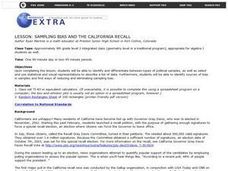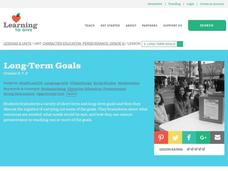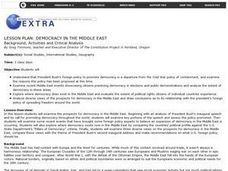Curated OER
Philanthropy in Literature
Students define the term philanthropy and find examples of it in everyday life. In this philanthropy activity, students try to define philanthropy and illustrate it. Students then work in groups to define the term and create a web for...
Curated OER
Right to vote...in the wrong place
Students create a presentation for other class members or for a local citizens' group explaining how they can guard ensure voter rights. Students research the Ohio Secretary of State's stand on provisional voting rules.
Curated OER
Young Voters Make A Difference
Students research recent statistics on voting by those 18 to 24. They survey senior students to determine their intent to vote in the next election. Students display the data in charts and graphs. They write the results and share it with...
Curated OER
Homemade Political Parties
Use this 5-day lesson to clarify the platforms of the two major parties, comparing and contrasting against students' beliefs. Begin by looking at unlabeled summaries of both party platforms, having learners identify most with one. Groups...
Curated OER
Sam Houston for President...Again
Fourth graders discover the political career of Sam Houston. In this Texas history instructional activity, 4th graders research primary resources and create a modern-day version of Sam Houston's political campaign of the 1840s.
Curated OER
Presidential Eligibility
Students examine what requirements determine who can and can't run for president.
Curated OER
Constitution Day: The 1965 Alabama Literacy Test
Tenth graders examine the United States Constitution. In this American Government instructional activity, 10th graders read excerpts from President Johnson's speech to Congress and parts of the Voting Rights Act of 1965. ...
Curated OER
Time for Change? A look at Canada's electoral system.
Tenth graders cultivate respect and appreciation for Canadian Parliamentary democracy. They build curiosity and interest in studying citizenship issues related to Parliament and by engaging in a mock election.
Curated OER
What Makes a Good Judge?
Students define qualities that should be considered when selecting judge, evaluate costs and benefits of two methods of selecting and retaining judges, decide whether methods provide for judicial independence
and judicial accountability,...
Curated OER
Show Me the Money!
Students investigate the importance of campaign finances in elections in the United States by gathering information from various Web sites about campaign finances of different Presidential hopefuls.
Curated OER
Writing a Political Leader
Students investigate politics by writing a formal letter. In this U.S. Government lesson, students discuss political issues they would like to address and research their topic using the Internet. Students locate an appropriate political...
Curated OER
A More Perfect Union: Women's Suffrage and the Constitution
Young scholars reflect on the pros and cons of Women's Suffrage and it was viewed during the late 1800's. In this history lesson, students will analyze documents on women's suffrage so that they can compare and contrast the rights of...
Curated OER
Sampling Bias And the California Recall
Using a 2002 California Gray David recall vote as an example, young statisticians identify sources of bias in samples and find ways of reducing and eliminating sampling bias. They consider ways to select random samples from a...
Curated OER
Validating Votes
Explore the discrepancies in Florida's vote counting process in 2000 and 2002 with this New York Times reading lesson. Middle schoolers study the viewpoints presented in informational text, paying attention to how word choice can...
Curated OER
The Kid Who Ran for President
In this reading worksheet, students answer 10 multiple-choice questions about the book. For example, "Why did Judd change his parakeet's name?"
Curated OER
Government
Second graders run for various offices. They dress up like a politician, pretend to be running for an office, and tell the students why they should vote for him/her. They explain why it is necessary for a community to have a government
Curated OER
Date with Destiny
Students examine the outcome of the war in Iraq. In this Iraq history instructional activity, students discuss the effects of the war and the regime of Hussein. Students write and design textbook pages that feature the contemporary...
Curated OER
Desmond Tutu
Sixth graders examine the contributions of Desmond Tutu and the history of apartheid in South Africa. They listen to the book "The Story of Ruby Bridges," listen to a lecture and analyze a timeline, conduct an interview, and participate...
Curated OER
Redistricting: How Our Representatives Select Voters
Learners examine the practice of redistricting. In this American politics instructional activity, students read the provided articles "The Gerrymander," and "Reforming the Gerrymander." Learners respond to the provided discussion questions.
Curated OER
Jerry Rubin, Abbie Hoffman, and the 60s Counterculture
Students identify how American society responded to the 1960's counterculture. In this 1960's America lesson, students investigate multimedia sources in order to examine the movement and its impact on the country.
Curated OER
Long-Term Goals
Middle schoolers set long-term and short-term goals. In this character education lesson, students determine whether goals that they write for themselves are long-term or short-term.
Curated OER
What is Suffrage? Understanding the Right to Vote
Students discover one of the restrictions forced on women of the early 1900s. In this civil rights lesson, students investigate suffrage and why women were not allowed to vote in the early twentieth century. Students create a mock...
Curated OER
Democracy in the Middle East
Learners explain that President Bush's foreign policy to promote democracy is a departure from the Cold War policy of containment, and examine the reasons this policy has been proposed at this time.
Curated OER
What is a war criminal?
Learners read the story Former president denies war crimes. They then read three different situations and discuss the situations. Students draw up plans for fair war, learners are divided into two equal halves. The students and their...

























